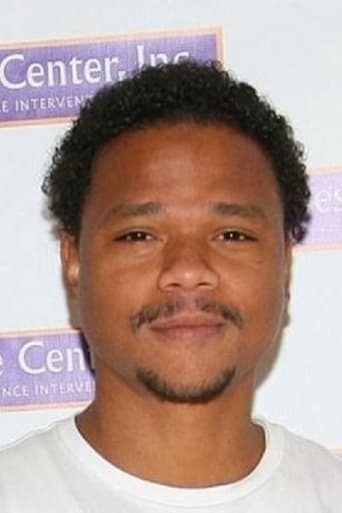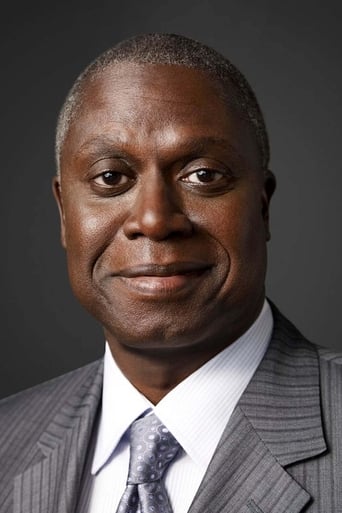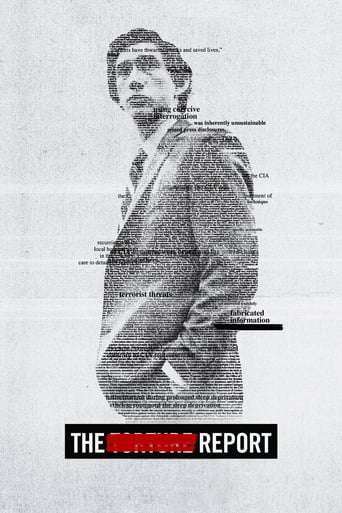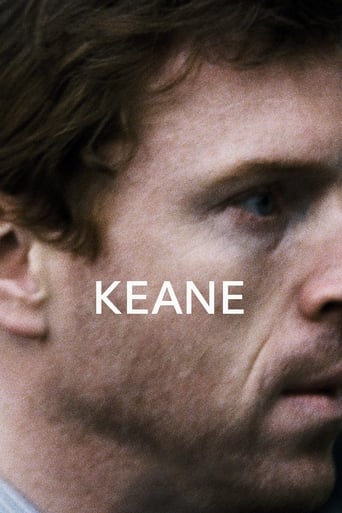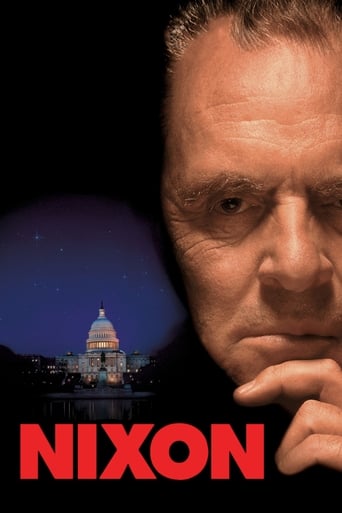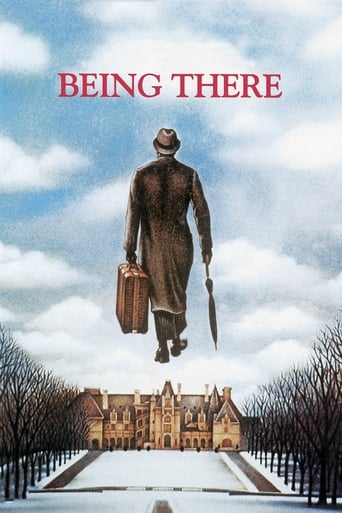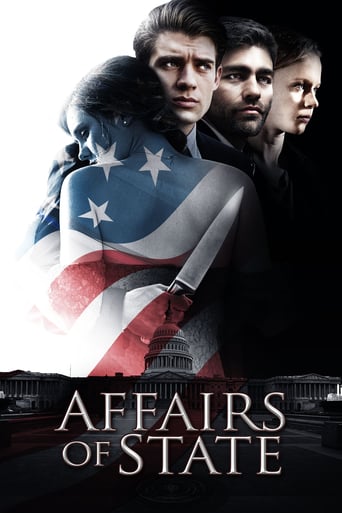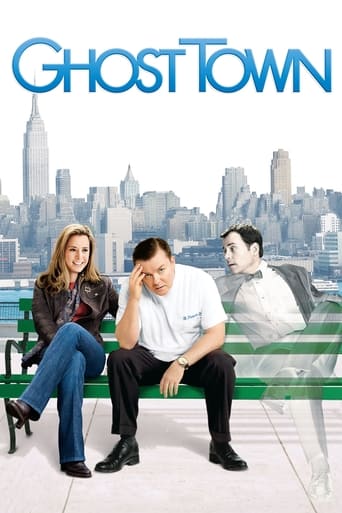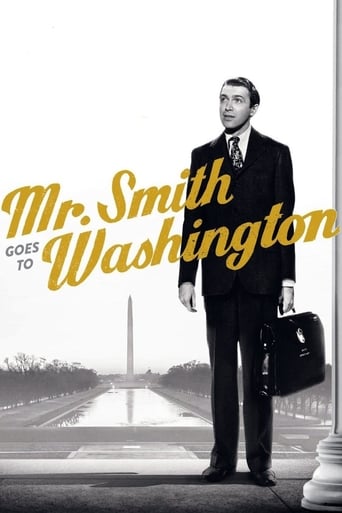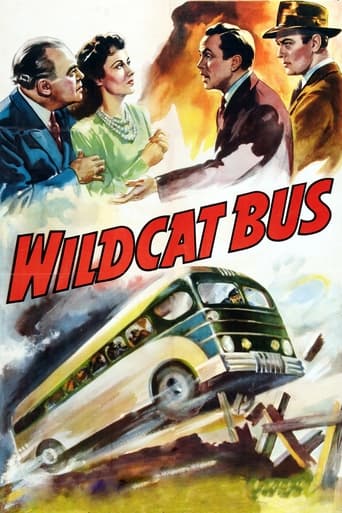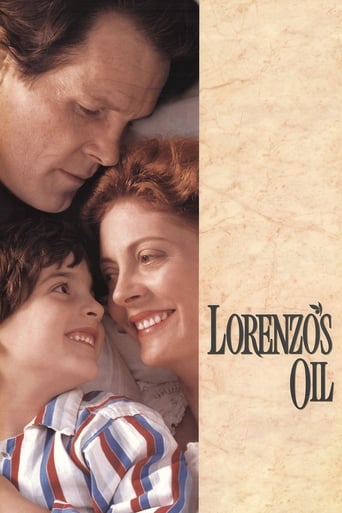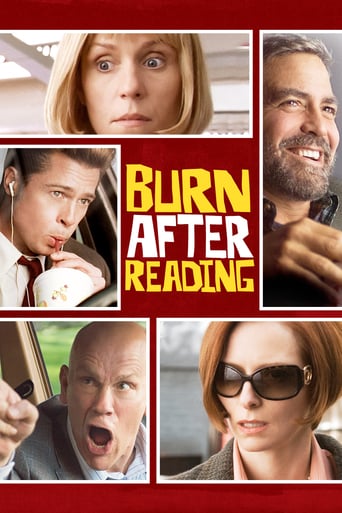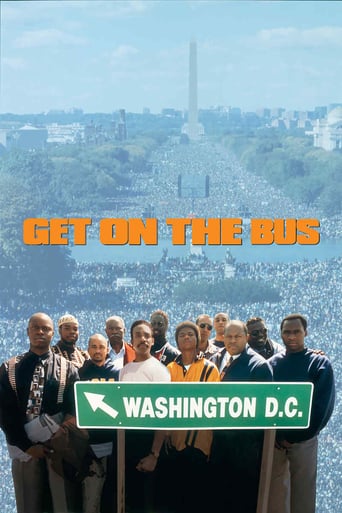
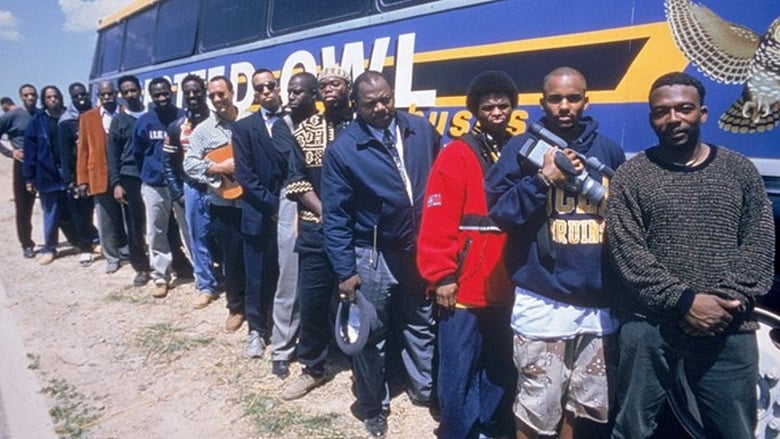
Get on the Bus (1996)
Several Black men take a cross-country bus trip to attend the Million Man March in Washington, DC in 1995. On the bus are an eclectic set of characters including a laid-off aircraft worker, a man whose at-risk son is handcuffed to him, a black Republican, a former gangsta, a Hollywood actor, a cop who is of mixed racial background, and a white bus driver. All make the trek discussing issues surrounding the march, including manhood, religion, politics, and race.
Watch Trailer
Cast


Similar titles
Reviews
I'm speechless. I never heard anything about this Spike Lee joint until I accidentally came across it on Amazon. Sadly, the reviews on there were so-so and made me believe I wouldn't enjoy the film. This is now my favorite Spike Lee joint. I'm sorry to have waited so long. All of the performances were outstanding and the actors worked well together and with the themes discussed. I was glad that nothing was predictable.This movie is as fleshed out as they come, very multi-layered. The resolution was very satisfying. I will be buying this film for others as well. A++++++++++ 10 stars, Spike did it again.
Spike Lee's "Get On the Bus" sees a group of African-American men boarding a bus to Washington, DC. Once there they hope to attend the Million Man March. The brainchild of Louis Farrakhan, the event was staged in an attempt to draw attention to the various social and economic ills plaguing the African-American community.Much "African American art" between the period of 1985-1995 took aim at what was perceived to have been a failure in black manhood (the March itself excluded women). Black problems were seen to be exclusively a "black problem", and one which could be fixed if only black males "became better role models", "stopped blaming whites", "stopped engaging in crime" and "picked themselves up by their bootstraps". Blacks, in other words, should improve their conditions, a stance which radical African American activist Carl Dix would mock: "Black youth pulling up their pants doesn't stop factories moving half way around the world. Don't treat results as if they're causes!" Lee's "Get On The Bus" is another tract which ignores systems and mistakes results and causes. His film's bus is filled with various characters, all of whom are stereotypes. And so we meet the wise black man, the religious black man, the gay black man, the hard working black man, the young artist, the middle-aged actor, the Jewish bus driver, the homophobe, the civil worker, the mixed race black man, the tough guy, the bad father, the petty criminal, the sensitive guy etc. After he sets up various preconceptions and clichés, Lee then reverses them by employing various countercliches. By its end, "Bus" posits black progress as being dependent upon the negotiation of conflicting attitudes, and the weathering of both generational shifts and divisions within black communities. The film's opening sequence, which conveys all the film's themes in a concise manner, exemplifies this. Here we see shots of an African in chains, whilst the lyrics to Michael Jackson's "On The Line" unfold: "No sense pretending it's over, hard times just don't go away, you must take that chip off your shoulder, open up and have some faith. Nothing good ever comes easy, all good things come in due time, have something to believe in, open your mind." "Get On The Bus" sports fine performances by Charles S. Dutton and Wendell Pierce, the latter playing a Republican businessman who is comically thrown off Lee's bus (another Republican stays on). The rest of Lee's cast are unconvincing, largely due to a heavy handed, overly didactic screenplay. The film was shot on a tiny budget over the course of 18 days.6/10 – Worth one viewing.
Another FINE effort by America's most UNDERrated filmmaker. His knowledge on the subject of racism is STAGGERING, and IMPRESSES me on more than one level. Accusations that Lee is really just a devious little racist, a poisonous dwarf who opportunistically exploits Hollywood's Affirmative Action system to make movies of inferior quality is utter NONSENSE, mere Right-Wing propaganda. The very notion that Lee would resort to misusing the current climate of political correctness in America in order to produce hate-filled anti-white movies is simply FALSE and malicious.Some of Lee's detractors even go so far as to suggest that GOTB glorifies African-Americans, while putting down other races: obviously, another FALSEHOOD disseminated by people who are AGAINST peaceful co-existence between different races in America and elsewhere.My favourite scene in the movie is a lengthy dialogue early on between the rich black Republican and the others in the bus. The views presented by that man are simply WRONG - all across the board. 100% UNTRUE. He LACKS education, unlike the brilliantly INFORMED guys who quite DESERVEDLY throw him off the bus.TERRIFIC performances, and an INTELLIGENT script make for a viewing experience that has been RARELY rivaled by any political movies made since.I also want to point out the incessant LIES that the Million-Man March had only 80,000 people taking part in it!(And now all you have to do is take the antonyms of all the words written in capital letters...)So what message does Lee send here? If someone doesn't agree with your political views, you simply apply violence and throw him off the bus. I thought the movie said "get ON the bus"...?Apparently, Mr.Lee is for bus-segregation after all, i.e. is no different than those KKK lunatics before him: the bus is only for those blacks who are in line with the Democratic Party's line of thinking. So much for "freeing the slaves"...The end-credits: "This movie was entirely financed by black people." And distributed and marketed by a major Hollywood studio run by Jews and whites whom Farrakhan despises...
I'm not a black man in America, but I've loved all of Spike's films and quite frankly, I wish people (not, by and large, the commenters on this film, refreshingly) would attempt to make films "black" or "white" or "Latino" or any other social or political or religious demeaner. This is a wonderful film and all people should be able to appreciate it. I would like to respond to those who think this is a "white-berating" movie or something. One word: please. The vast majority of the dialogue in this film is African-American focused and there is very little criticism of The White Man. Those of you who claim otherwise, well, to quote Shakespeare, "I think thou doth protest too much." Lee has given the black man, as they like to say in liberal arts grad school programs, agency. He has presented the wide range of black circumstances. These are not victims of drive-by shootings, gang-bangers, or basketball players. I did find the characters a bit stock in their very attempts to convey such distinctly different elements of the black experience. It was as though Spike ticked off boxes saying, OK, we have a conservative black man, we have a struggling middle-class black man, we have an egomaniacal black man..but having said that, it is only possible for that to be a criticism because as viewers, we are so unused to seeing black men depicted in complex ways. As a white guy who's worked in largely minority schools for a decade and was The White Guy who'd attend all the functions of the minority student association events in college-that is to say, I enjoyed learning about all manner of racial diversity, I don't think, that as a white person, it's appropriate to judge the fitness of folks of another ethnicity to use words which might seem a little coarse. If people want to use those words, when they do not refer to me, what is it to me? If white folks hadn't been using those words back in the day, the use of those words would not even be an issue now. Anyway, I'm rambling, but it seems that this film was made, essentially, as one of those rare vehicles which allows people (not that many people saw this film, of course.....) to see black men as humans. We see an egomaniacal, sexually-insecure man named Smooth (the fantastic Andre Braugher). We see a light-skinned African American (the very talented Roger Guenver Smith) who must answer barbed criticisms from Smooth about his claim to a legitimate place in the African-American community, Charles Dutton, criminally underemployed in modern movies as the organizer of the bus journey to the Million Man March and the glue who holds (as best he can) the trip together. We see two gay men (Isaiah Washington (ya really think the man is homophobic?)) and Henry Lennix as Randall (also excellent) whose relationship is challenged by Randall's insecurity about it. Ossie Davis is brilliant as an older man who largely keeps his counsel but when needed to keep the train from coming off the tracks, seems to know just how to calm the storm. A hard-working middle-class man named Evan (the reliable Thomas Byrd Jr., a regular in Lee's movies) is struggling with how best to raise his son. His heart is in the right place but the job is not easy. His son, Jamal (Gabriel Casseus giving a nuanced performance communicating all range of depth and yet at the same time, the simplicity which only a young person can convey). The black man who turns out to be self-hating, and who joins the bus (for a short time, in Memphis), Wendell, is amusingly and with a great deal of satisfaction, I would imagine, to all positive and forward-thinking blacks (and folks of other colors) dealt with quite appropriately. His behavior is quite disgraceful and as I watched him I hoped that he would get the harsh comeuppance which he did indeed receive.The cinematography of the bus travelling through the American west is bleached out in order to convey the starkness of the landscape and in order that the focus remains on these rich, wonderfully human characters. Lee does a fantastic job directing. I'm not willing to say this is his best film when the man has directed "Do The Right Thing", and "When the Levees Break" which is all you need to know about Hurricane Katrina. But saying this film is worse than those two is not saying anything bad about this film. It is excellent and it is a tribute to black men which more people should see so that in America more people understand that black men are as diverse as there are grains of sand on the ocean.



